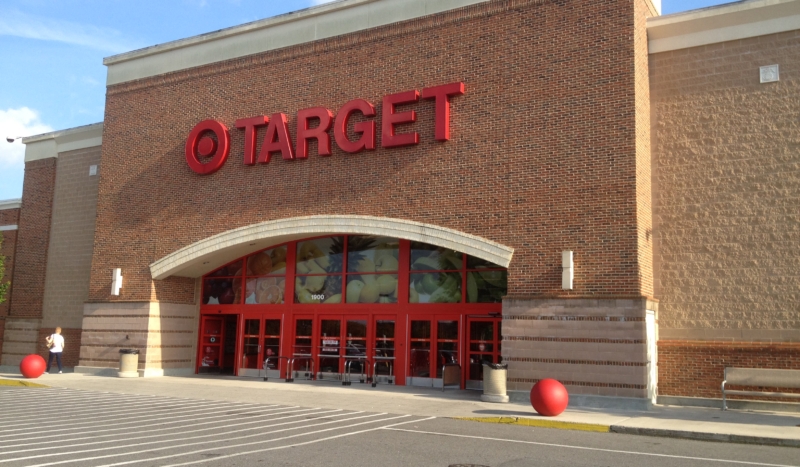
By Mike Kalasnik from Fort Mill, USA - Target Rock Hill, SC, Uploaded by AlbertHerring / Wikipedia
CV NEWS FEED // Target’s sales have continued to plummet amid a mass months-long boycott that started with the retail giant’s decision to carry a “pride line” of LGBTQ-themed clothing, including for children.
Target’s “second-quarter sales fell for the first time in six years,” reported Tyler O’Neil of The Daily Signal on Wednesday:
May 29-July 29 sales at stores open for at least one year dropped 5.4%, including a 10.5% decline online, CNN Business reported. The company cut its annual sales forecast.
Even the retail giant’s foot traffic declined in the second quarter—by 4.8%. Michael Baker, an analyst at the investment banking company DA Davidson, attributed the foot traffic decline to “a mix that skews too discretionary, as well as the Pride merchandise issues.”
Target’s stock dropped 27% over the past year, from $177 per share to $135 per share on market open.
Mairead Elordi of The Daily Wire reported that Target “has lowered its overall sales and profit expectations for the whole year,” citing “recent sales trends.”
Elordi described some of the “pride” merchandise that sparked the backlash:
a kids swimsuit with a tag reading “thoughtfully fit on multiple body types and gender expressions.”
…
LGBT-themed books aimed at young children, such as “The Pronoun Book” and “Bye Bye Binary,” a story about a “joyful baby” who “refuses to conform to the gender binary and instead chooses toys, colors, and clothes that make them happy.”
…
an adult “Pride” collection, which included “tuck-friendly” swimsuits for men who identify as women to tuck their genitals, a t-shirt with the words “Queer Queer Queer Queer,” and a hoodie reading “Not A Phase.”
The retailer’s CEO Brian Cornell blamed his company’s sinking sales numbers on people choosing “to increase spending on services like leisure, travel, entertainment and food away from home,” as well as theft.
Cornell also mentioned an increase in crime. “Safety incidents associated with [theft] are moving in the wrong direction.”
As the boycotts began in mid-May, Cornell defended his store’s decision to carry its unusual “pride” merchandise. “I think those are just good business decisions, and it’s the right thing for society, and it’s the great thing for our brand,” the CEO said.
However, in an opinion piece for Newsweek, Paul Du Quenoy noted that
Suffering an unmitigated sales and public relations disaster, Target removed some of the offensive merchandise—which included “tuck-friendly” swimwear—and moved other items to more discreet parts of its stores, walking back the supposed wisdom of marketing to a marginal fringe that advocates a radical gender ideology most Americans reject.
>> RELATED: TARGET DELETES SATANIC PRODUCTS FROM WEBSITE <<
“Across the corporate world, the lesson is clear. Messaging support for radical ideologies antagonizes far more Americans than it attracts,” Du Quenoy added:
Those who are offended readily spend their dollars elsewhere while woke executives shake their heads, lose their jobs, and watch profits flow to competitors smart enough to stay out of politics. Meanwhile, the progressive Left plots new strategies to bully and blackmail businesses into broadcasting their loathsome ideology. Contrary to their expectations, the consumer has the power to reject it.
Target is not the first major corporation to suffer huge financial losses after embracing “woke” politics.
Earlier this year, Bud Light’s sales also plummeted following its disastrous marketing partnership with “trans” activist Dylan Mulvaney. As CatholicVote reported:
After Bud Light partnered with Mulvaney for a social media campaign in an attempt to appeal to a wider audience, the brand faced backlash resulting in a full boycott from many previously loyal customers.
The boycott has been so successful that Bud Light has bought back expired, unsold beer from wholesalers.
The company’s sales took a major hit. In the second week of May, sales were down by 28% compared to the previous year.
In June, just two months after the boycott began, Bud Light ceased being the most popular beer brand in America for the first time in two decades.
In late July, beer distributors said Bud Light would not recover from its massive losses. One distribution executive said, “Consumers have made a choice. They have left [Bud Light] and that’s how it’s going to be. I don’t envision a big percentage of them coming back.”
Businessman, serial investor, and Shark Tank star Kevin O’Leary announced plans this coming fall to teach classes at various business schools across the country, discussing the meteoric decline of Bud Light.
He called the turn of events surrounding the once-dominant beer brand “an extraordinary case.”
“To lose 25% of the market share has never been achieved,” he said on X (formerly Twitter). “We’re still talking about this situation months later, and they continue to lose share!”
Back in June, O’Leary also weighed in on Target when its business numbers were only starting to decline.
“The stunning collapse of Target’s market cap is almost unprecedented,” he said then during an appearance on the FOX News show “Jesse Watters Primetime.”
“If you start to get too distant or too far away from the primary mandate, the market has proven itself to really, really punish you,” O’Leary continued referring to the successful boycott.
“Look at Budweiser Light. It took decades to create the American beer and exactly 32 hours to destroy it.”

